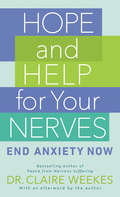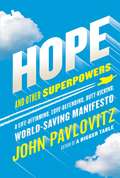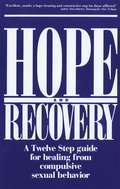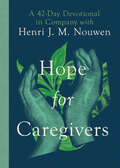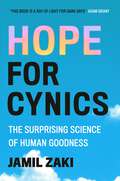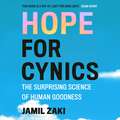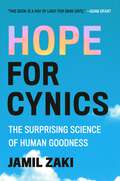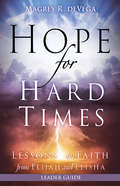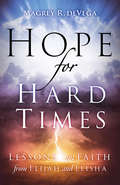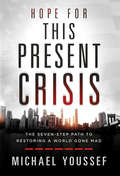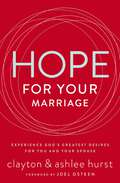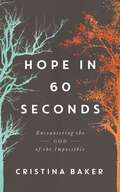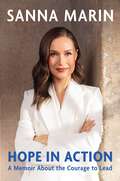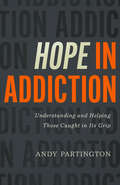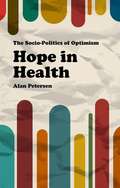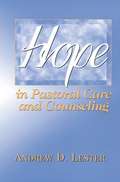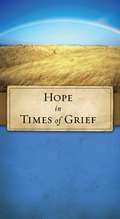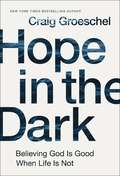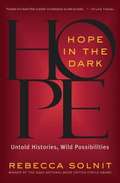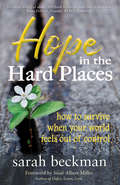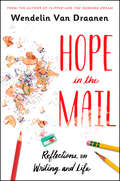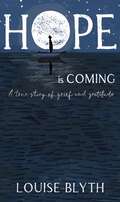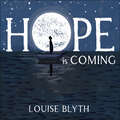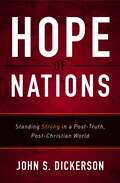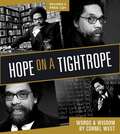- Table View
- List View
Hope and Help for Your Nerves
by Claire WeekesA proven program that desensitizes over-wrought nerves and eases feelings of anxiety, panic, and depression by using a variety of breathing and relaxation exercises. "I recommend it with my whole heart. " - Ann Landers .
Hope and Other Superpowers: A Life-Affirming, Love-Defending, Butt-Kicking, World-Saving Manifesto
by John PavlovitzOverwhelmed by the news cycle and the state of affairs in our world? Pastor, blogger, and powerful voice in the Resistance, John Pavlovitz has the answer: this rousing and inspirational guide, drawing from lessons of our favorite superheroes, for how we can band together, live more heroically (and meaningfully), and save the world. It&’s exhausting to give a damn these days, isn&’t it? Perhaps you&’re feeling anguished about what you see on the news or in your social media timeline, or by your personal circumstances, and are paralyzed waiting for political or religious leaders, or celebrities, to rescue us from it all. But what if you didn&’t have to wait for someone else? What if you could be the hero? This book—a spirited call to action—shows you how. In these pages, John offers a path away from the vitriol and toward compassion, and a plan to transform our burdens into dreams and our outrage into activism. Drawing from lessons of beloved fictional superheroes, John shows us how to identify our origin story, build protective suits of armor, guard against our personal kryptonite, and vanquish our villains. He also identifies ten specific &“superpowers&” that we can enlist to make our lives and our world better. Along the way, he shares inspiring anecdotes and profiles about ordinary people who saw a gap in the world in empathy or kindness or gratitude and decided to fill it. Hope and Other Superpowers is an invitation to anyone hoping to be the kind of person the world so desperately needs—the kind who can save it. In other words: it&’s an invitation to you.
Hope and Recovery: A Twelve Step Guide for Healing From Compulsive Sexual Behavior
by AnonymousHope and Recovery guides and supports the life-transforming move from self-defeating and destructive sexual behavior to healthy, affirming sexuality.A remarkable work, Hope and Recovery guides and supports the life-transforming move from self-defeating and destructive sexual behavior to healthy, affirming sexuality. This widely acclaimed contribution to addiction literature applies the Twelve Step Program of Alcoholics Anonymous to the complex problem of sex addiction.
Hope for Caregivers: A 42-Day Devotional in Company with Henri J. M. Nouwen
by Henri NouwenHenri Nouwen's timeless wisdom reminds us once again of the transformation that love brings, both when we allow ourselves to give love with abandon and when we allow ourselves to receive love.Hope for Caregivers
Hope for Cynics: The Surprising Science Of Human Goodness
by Jamil ZakiCynicism is making us sick; Stanford psychologist Dr Jamil Zaki has the cure - a 'ray of light for dark days' (Adam Grant, #1 New York Times bestselling author).For thousands of years, people have argued about whether humanity is selfish or generous, cruel or kind. But recently, our answers have changed. In 1972, half of Americans agreed that most people can be trusted; by 2018, that figure had fallen to 30%. Different generations, genders, religions and political parties can't seem to agree on anything, except that they all think human virtue is evaporating. Cynicism is a perfectly understandable response to a world full of injustice and inequality. But in many cases, cynicism is misplaced. Dozens of studies find that people fail to realise how kind, generous and open-minded others really are. And cynical thinking worsens social problems, because our beliefs don't just interpret the world; they change it. When we expect people to be awful, we coax awfulness out of them. Cynicism is a disease, with a history, symptoms and a cure. Through science and storytelling, Jamil Zaki imparts the secret for beating back cynicism: hopeful scepticism. This approach doesn't mean putting our faith in every politician or influencer. It means thinking critically about people and our problems, while simultaneously acknowledging and encouraging our strengths. Far from being naïve, hopeful scepticism is a more precise way of understanding others, and paying closer attention re-balances how you think about human nature. As more of us do this, we can take steps towards building the world we truly want.
Hope for Cynics: The Surprising Science Of Human Goodness
by Jamil ZakiCynicism is making us sick; Stanford psychologist Dr Jamil Zaki has the cure - a 'ray of light for dark days' (Adam Grant, #1 New York Times bestselling author).For thousands of years, people have argued about whether humanity is selfish or generous, cruel or kind. But recently, our answers have changed. In 1972, half of Americans agreed that most people can be trusted; by 2018, that figure had fallen to 30%. Different generations, genders, religions and political parties can't seem to agree on anything, except that they all think human virtue is evaporating. Cynicism is a perfectly understandable response to a world full of injustice and inequality. But in many cases, cynicism is misplaced. Dozens of studies find that people fail to realise how kind, generous and open-minded others really are. And cynical thinking worsens social problems, because our beliefs don't just interpret the world; they change it. When we expect people to be awful, we coax awfulness out of them. Cynicism is a disease, with a history, symptoms and a cure. Through science and storytelling, Jamil Zaki imparts the secret for beating back cynicism: hopeful scepticism. This approach doesn't mean putting our faith in every politician or influencer. It means thinking critically about people and our problems, while simultaneously acknowledging and encouraging our strengths. Far from being naïve, hopeful scepticism is a more precise way of understanding others, and paying closer attention re-balances how you think about human nature. As more of us do this, we can take steps towards building the world we truly want.
Hope for Cynics: The Surprising Science of Human Goodness
by Jamil ZakiAmazon Editors' Pick for Best Nonfiction Books of 2024 Cynicism is making us sick; Stanford Psychologist Dr. Jamil Zaki has the cure—a &“ray of light for dark days&” (Adam Grant, #1 New York Times bestselling author). For thousands of years, people have argued about whether humanity is selfish or generous, cruel or kind. But recently, our answers have changed. In 1972, half of Americans agreed that most people can be trusted; by 2018, only a third did. Different generations, genders, religions, and political parties can't seem to agree on much, but they all think human virtue is evaporating. Cynicism is an understandable response to injustice and inequality. But in many cases, it is misplaced. Dozens of studies find that people fail to realize how kind, generous, and open-minded people really are. And cynical thinking deepens social problems: when we expect the worst in people, we often bring it out of them. We don't have to remain stuck in this cynicism trap. Through science and storytelling, Jamil Zaki imparts the secret for beating back cynicism: hopeful skepticism—thinking critically about people and our problems while honoring and encouraging our strengths. Far from being naive, hopeful skepticism is a precise way of understanding others that can rebalance our view of human nature and help us build the world we want.
Hope for Hard Times Leader Guide: Lessons on Faith from Elijah and Elisha (Hope for Hard Times)
by Magrey deVegaWe’ve all been there. Rock bottom. The end of our rope. The last straw. During hard times, it often seems like the only option is to throw in the towel.In Hope for Hard Times, author Magrey deVega examines the lives of the great biblical prophets Elijah and Elisha and reveals a consistent message in their stories: Don’t give up, and don’t lose hope. Trust that God will help you find a way.When you look closely at the accounts of Elijah and Elisha from 1 Kings 17 to 2 Kings 8, you will find amazing stories of God’s provision. God provides for Elijah, as he faces down opposition in a mountaintop showdown and when he feels alone and ready to give up while hiding in a cave listening for God’s still, small voice. God provides for Elisha, when he brings healing to Naaman and when he is surrounded by enemies and praying for spiritual eyes to be opened to hope.There is hope for you in hard times. Your story of hurt, heartache, and hopelessness has been heard, and God has a message for you. Read these stories, pray through them, and listen as you receive encouragement and guidance for whatever you are facing today. Open your eyes, and open your hands. For just like ravens at the Brook Cherith, God is with you, giving you everything you need.The Leader Guide contains everything needed to guide a group through the four-week study including session plans, activities, and discussion questions, as well as multiple format options.
Hope for Hard Times: Lessons on Faith from Elijah and Elisha (Hope for Hard Times)
by Magrey deVegaWe’ve all been there. Rock bottom. The end of our rope. The last straw. During hard times, it often seems like the only option is to throw in the towel.In Hope for Hard Times, author Magrey deVega examines the lives of the great biblical prophets Elijah and Elisha and reveals a consistent message in their stories: Don’t give up, and don’t lose hope. Trust that God will help you find a way.When you look closely at the accounts of Elijah and Elisha from 1 Kings 17 to 2 Kings 8, you will find amazing stories of God’s provision. God provides for Elijah, as he faces down opposition in a mountaintop showdown and when he feels alone and ready to give up while hiding in a cave listening for God’s still, small voice. God provides for Elisha, when he brings healing to Naaman and when he is surrounded by enemies and praying for spiritual eyes to be opened to hope.There is hope for you in hard times. Your story of hurt, heartache, and hopelessness has been heard, and God has a message for you. Read these stories, pray through them, and listen as you receive encouragement and guidance for whatever you are facing today. Open your eyes, and open your hands. For just like ravens at the Brook Cherith, God is with you, giving you everything you need.Components for this 4-session study will include a book, leader guide, and four streaming videos available online featuring Magrey outlining each topic in an accessible and engaging way.Sessions Include: When the Odds Seem Against You (1 Kings 17 and 18) When You Feel Down and Out (1 Kings 18-21) When Life Takes a Turn (2 Kings 2) When All Seems Lost (2 Kings 4-8)
Hope for This Present Crisis: The Seven-Step Path to Restoring a World Gone Mad
by Michael YoussefOur culture has lost its mind. Now, we are waging a bigger fight—a war for our soul. Is it possible our world has gone mad? We are under siege and the war is not from without; it is from within. The collapse of the Roman Empire occurred in a single generation and was not so much the result of invasions by their enemies but the result of moral decay and internal corruption. Similar patterns are emerging in America. We neglected or abandoned our traditional institutions long ago, but now it&’s time to take them back. Today, forces are at work to strip the principles and precepts of faith from public venues or minimize their significance. Many progressive leaders are convinced that when Christianity disintegrates it will create peace on earth. But the loss of our heritage will merely create a spiritual vacuum that will be filled with folly, crammed with chaos, or invaded by Islam. The reality is: Western civilization will become so decadent and reckless that America will collapse like a house of cards. In Hope for This Present Crisis, Dr. Youssef provides a diagnosis of the insanity of the current culture and a seven-step prescription for restoring sanity to a world gone mad. Here&’s the seven-step path to restoring a world gone mad: Remember the Truth – Stand firm on the truth of the gospel.Restore the Soul – Seek God&’s approval─ not the approval of other people.Revitalize theFamily – Guard your children from the horrors of the Internet.Reestablish the Classroom – Support conscientious, caring public school teachers.Respect our Freedoms – Know your rights.Reform our Society – Morally and spiritually purify yourself.Revive the Church – Demonstrate the forgiving love of Jesus at all times.This book will teach you how to stand up to attacks on your faith, and defend Christianity as a meaningful contribution to society.
Hope for Your Marriage: Experience God’s Greatest Desires for You and Your Spouse
by Joel Osteen Clayton Hurst Ashlee HurstClayton and Ashlee Hurst share the principles and Scripture they have learned to lean on and preach at Lakewood Church. Foreword by Joel Osteen.Are you willing to do whatever it takes to have the marriage you dreamed of? Interestingly, this is the question Clayton and Ashlee ask young couples before they get married and married couples in crisis. If they answer yes, then there is hope for the couple. If they are willing to commit to the hard work ahead, they have a very good shot.Hope for Your Marriage is a book designed for couples who desire to have the best marriage possible. Every marriage has the potential to be incredible when God is at the center.In Hope for Your Marriage, Clayton and Ashlee share personal stories on overcoming fairy-tale pitfalls; keeping Jesus at the center of your marriage; practicing healthy communication on sex, conflict, and forgiveness; declaring life over your marriage; and leaving a God-honoring legacy.
Hope in 60 Seconds: Encountering the God of the Impossible
by Cristina BakerNow more than ever, we all face trying situations. The hope we need and hunger for is not a strategy or state of mind, but faith in Jesus. He stands secure for us in the face of every trial, from loss to sickness to injustice. Through 20 short prayers, 10 personal stories of miraculous transformations, and Biblical teachings, Hope in 60 Seconds will help you take the first steps towards a journey of security in the hope of Jesus.&“At twenty-one I was as far from hopeful as anyone could get. Maybe as far as you are now.&”These are the words of Cristina Baker as she considered her traumatic life: from childhood abuse to troubled teen years, to a descent into substance abuse, she resonates with a lost world who understands first-hand how easy it is to lose hope. Then, just as she was about to go to jail for drug possession, the Hero of Hope, Jesus Christ, came into her life and set her on a completely new path.If you are weary and doubting, Cristina understands. Hope in 60 Seconds will help you to:Be encouraged and empowered by someone who has been in a similar place of discouragement and discovered Christ&’s authority and love,Learn how Jesus establishes hope and begin to experience it first-hand in the darkest of circumstances,Grow in your ability to connect with Jesus and find the hope you have longed for all of your life, andProve that a connection with Jesus is the ultimate source of hope.The message of Cristina&’s life is Jesus, the hope we need and hunger for—a hope that will stand secure in the face of brokenness, loss, sickness, abuse, a brain tumor diagnosis, injustice, and death. In Hope in 60 Seconds, she shares the steps of her journey to encounter, receive, and walk in the hope of Jesus, and offers readers powerful wisdom for how they can take the same journey for themselves.
Hope in Action: A Memoir About the Courage to Lead
by Sanna MarinSanna Marin, the world&’s youngest prime minister when she took office, shares her inspiring path to leadership and encourages readers to effect change in the world.In Hope in Action, Sanna Marin takes readers on the extraordinary journey of her trailblazing career and exemplifies a new kind of leadership. When she became prime minister of Finland at just thirty-four years old, Marin was the youngest world leader at the time, captivating international attention with her progressive ideas and decisive action in a crisis. Marin&’s story is one of resilience and hope. The first in her family to attend university, she broke barriers to become a highly respected role model for many young girls and women. Her term as prime minister saw historic milestones—she led Finland through the COVID-19 pandemic, and her government implemented reforms addressing climate change, social justice, and equality. She helped the country navigate neighboring Russia&’s devastating full-scale invasion of Ukraine and Finland&’s rapid joining of NATO—the swiftest entry for any country in the alliance&’s history. Through vivid retellings of her experiences, Marin shares how she overcame significant political challenges and how she coped with her personal life becoming public, as in an incident that sparked a media frenzy and prompted women around the world to express their support. Hope in Action is more than a memoir—it&’s a rallying cry. Marin urges the next generation of leaders to bring their full selves to the job. Her story is an empowering testament to the opportunities we have to effect real change.
Hope in Addiction: Understanding and Helping Those Caught in its Grip
by Andy PartingtonLondon&’s suburbs. Latin America&’s megacities. West Africa&’s villages. China&’s skyscrapers. North America&’s homes.Addiction is a worldwide and at-home epidemic.A powerful look at the gospel for the addicted, Hope in Addiction helps us think about what it means to be the Church in light of this growing—and heartbreaking—epidemic.How did we get here? And how can we find freedom from addiction? This book is not just about drug or alcohol abuse. It&’s about gambling addictions, porn dependencies, workaholism, and internet addictions. It&’s a book about how slaves to addiction can experience freedom as children of the living God and family in the community of God. Wherever they are. Whatever has enslaved them.With clarity and compassion, Andy Partington brings together personal stories, compelling research, and frontline ministry experience. This book is for Christian leaders, influencers, counselors, and educators. For the friends and family of those gripped by addiction. And, for those who themselves battle addiction. This book is for all of us. There is hope in addiction. Hope for freedom. Hope for wholeness. Hope for eternity.
Hope in Health
by Alan PetersenThe language of hope permeates contemporary health and healthcare. It is believed that patients who are hopeful are more likely to recover, and health professionals endeavour to 'instil' or 'manage' hope in patients. The rhetoric of hope is extensively employed in marketing medical tests, treatments and devices. Despite this focus on hope in health, sociologists and other social scientists have failed to offer a systematic analysis of the discourses of hope and related practices. This book is the first to explore the socio-politics of hope in the contexts of health and healthcare. It highlights the significance of technological promise in contemporary conceptions of hope, making reference to examples such as stem cell treatments, medical testing, personal risk management, the use of self-tracking devices, and anti-ageing treatments and longevity research. The book concludes by arguing for scholars to take more seriously the significance of 'hope' in the contexts of health and healthcare.
Hope in Pastoral Care and Counseling
by Andrew D. LesterThis book focuses on clinical theories and methods for pastoral assessment of intervention with those who despair and offers a corrective measures to these stories through deconstruction, re-framing, and reconstruction.
Hope in Times of Grief
by Jonancy SundbergGrief and loss affect everyone. Whether it's a disappointment, death, or death of a dream, life's losses can make you feel sad, hopeless and discouraged. When your world seems to be falling apart, Hope in Times of Grief is an essential resource. With encouraging Bible verses and insightful quotes to speak to your sorrow and comfort your soul, you'll move through sadness and grief toward joy, peace, hope, and new beginnings.From the Trade Paperback edition.
Hope in the Dark: Believing God Is Good When Life Is Not
by Craig Groeschel“I want to believe, I want to have hope, but…” Pastor and bestselling author Craig Groeschel hears these words often and has asked them himself. We want to know God, feel his presence, and trust that he hears our prayers, but in the midst of great pain, we may wonder if he really cares about us. Even when we have both hope and hurt, sometimes it’s the hurt that shouts the loudest. Can God be good when life is not?In Hope in the Dark, Groeschel explores the story of the father who brought his demon-possessed son to Jesus, saying, “I believe! Help my unbelief!” In the man’s sincere plea, Jesus heard the tension in the man’s battle-scarred heart. He healed not only the boy but the father too, driving out the hopelessness that had overtaken him. He can do the same for us today.As Groeschel shares his pain surrounding the current health challenges of his daughter, he acknowledges the questions we may ask in our own deepest pain: “Where was God when I was being abused?” “Why was my child born with a disability?” “Why did the cancer come back?” “Why are all my friends married and I’m alone?” He invites us to wrestle with such questions as we ask God to honor our faith and heal our unbelief.In the middle of your profound pain, you long for authentic words of understanding and hope. You long to know that even in overwhelming reality, you can still believe that God is good. Rediscover a faith in the character, power, and presence of God. Even in the questions. Even now.
Hope in the Dark: Untold Histories, Wild Possibilities
by Rebecca SolnitWhen the first edition of Hope in the Dark was published in mid-2004 it gained an instant cult audience. Many readers were so inspired by Solnit's book that they bought multiple copies to give to friends. This new, significantly expanded edition covers, among other things, the political territory of America and the world after George Bush's re-election. Acclaimed author Rebecca Solnit draws on her life as a writer and activist, on the events of our moment, on our deepest past, to argue for hope--hope even in the dark. Solnit reminds us of how changed the world has been by the activism of the past five decades. Offering a dazzling account of some of the least expected of those changes, she proposes a vision of cause-and-effect relations that provides new grounds for political engagement in the present. Counting historic victories--from the fall of the Berlin wall to the Zapatista uprising to Seattle in 1999 to the worldwide marches against war in Iraq to Cancun in September 2003--she traces the rise of a sophisticated, supple, nonviolent new movement that unites all the diverse and fragmentary issues of the eighties and nineties in our new century.
Hope in the Hard Places: How to Survive When Your World Feels Out of Control
by Sarah BeckmanHope in the Hard Places is a practical, encouraging guidebook for the weary soul looking for hope in dark circumstances.In this life, everyone must face trials. Cancer, chronic illness, loss of a loved one, divorce, depression, prodigal children, caring for aging parents, and other unknown terrains can cause people to feel hopeless and helpless. For those who feel like they don&’t know where to turn, Hope in the Hard Places equips readers to walk through their trial with hope rather than desperation. Sarah Beckman, a speaker and author, teaches effective and powerful ways to get through the pain with biblical truths and principles. She also includes insight from others who have experienced all manner of trials. Packed with practical strategies, checklists, encouragement, wisdom from seasoned travelers, and rock-solid biblical truth, Hope in the Hard Places provides a beacon of hope in the darkness so that readers can walk through the depths of hardship with insight, dignity, and certainty.
Hope in the Mail: Reflections on Writing and Life
by Wendelin Van DraanenPart writing guide and part memoir, this inspiring book from the author of Flipped and The Running Dream is like Bird by Bird for YA readers and writers. <p><p> Wendelin Van Draanen didn't grow up wanting to be a writer, but thirty books later, she's convinced that writing saved her life. Or, at least, saved her from a life of bitterness and despair. Writing helped her sort out what she thought and felt and wanted. And digging deep into fictional characters helped her understand the real people in her life better as well. <p> Wendelin shares what she's learned--about writing, life, and what it takes to live the writing life. This book is packed with practical advice on the craft: about how to create characters and plot a story that's exciting to read. But maybe even more helpful is the insight she provides into the persistence, and perseverance, it takes to live a productive, creative life. And she answers the age-old question Where do you get your ideas? by revealing how events in her own life became the seeds of her best-loved novels.Hope in the Mail is a wildly inspirational read for anyone with a story to share.
Hope is Coming: A true story of grief and gratitude
by Louise BlythHow can you lose the love of your life, but gain the greatest love you can ever know?In this gripping memoir, Louise Blyth charts the love story she shared with her husband and shares how it prematurely toppled into grief, pain and enlightenment. Hope Is Coming documents what happened when thirty-three-year-old George, a stoical and dynamic father of two, was diagnosed with advanced cancer. Told through letters, love notes and text messages, this true-story shares beautiful insight into one of life's biggest milestones. It tenderly provokes a deeper look inside our hearts and shines a light on some of life's biggest questions. The couple's story highlights the strength and fortitude of the human spirit, whilst also teaching that peace and connection with God can emerge from sadness. This book will speak to all of those who have loved, lost and search for the meaning of life in death.
Hope is Coming: A true story of grief and gratitude
by Louise BlythHow can you lose the love of your life, but gain the greatest love you can ever know?In this gripping memoir, Louise Blyth charts the love story she shared with her husband and shares how it prematurely toppled into grief, pain and enlightenment. Hope Is Coming documents what happened when thirty-three-year-old George, a stoical and dynamic father of two, was diagnosed with advanced cancer. Told through letters, love notes and text messages, this true-story shares beautiful insight into one of life's biggest milestones. It tenderly provokes a deeper look inside our hearts and shines a light on some of life's biggest questions. The couple's story highlights the strength and fortitude of the human spirit, whilst also teaching that peace and connection with God can emerge from sadness. This audiobook will speak to all of those who have loved, lost and search for the meaning of life in death.(P) 2021 Hodder & Stoughton Limited
Hope of Nations: Standing Strong in a Post-Truth, Post-Christian World
by John S. DickersonEvery week a terrorist attack, riot, or political scandal makes the headlines—and we feel the world around us shaking again. We struggle to separate truth from biased statements and hope from naïveté. We wonder how we got here and where these uncertain days will take us.One of the world’s top investigative reporters, John S. Dickerson, addresses this post-truth, post-Christian society in Hope of Nations. Hope of Nations shows us how and why the world is changing, where those changes will lead, and what it looks like to live like Christ in today’s society. With fascinating historical and political background, Dickerson helps us understand:The five major forces driving global change in the world todayWhy violent displays of Islam continue resurfacingThe incoming moral, social, and political impact of American millennialsTen ways to respond biblically to trends shaping the world right nowHow to live with Christian courage and compassion in tumultuous times“Times of great social upheaval are times of great spiritual opportunity,” writes Dickerson. “You can live the adventure of this era with great purpose. You can know with confidence that the Creator of the universe appointed you to bring light and life to this moment in human history.”Among the youngest award-winning journalists and a seminary-trained pastor, Dickerson brings his reporting skills, generational perspective, and biblical insights to this groundbreaking book.Get a larger view of what is happening with your community, your government, and your international neighbors in this thoughtful look at global events in light of your unique Christian calling.
Hope on a Tightrope: Words and Wisdom
by Cornel WestOffering openhearted wisdom for modern times, this courageous collection of quotations, speech excerpts, letters, and photographs is by the "New York Times"-bestselling author of "Democracy Matters".
